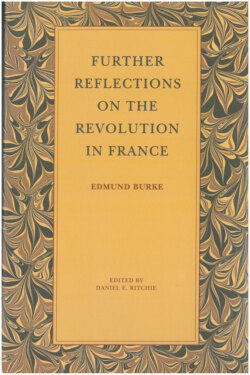Читать книгу Further Reflections on the Revolution in France - Edmund Burke - Страница 14
На сайте Литреса книга снята с продажи.
Оглавление3
A LETTER TO A MEMBER OF THE NATIONAL ASSEMBLY
May 1791
The recipient of A Letter to a Member of the National Assembly was François-Louis-Thibaut de Menonville. The opening paragraphs, which refer to Menonville’s response (Corr. Copeland 6:162–169) to Burke’s Reflections, acknowledge and then dismiss most of Menonville’s criticisms.
By the time he wrote A Letter, in January 1791, Burke had come to a deep understanding of the modern revolutionary mind and its method of defending itself: atrocities were to be set down as “excesses” provoked by its opponents; revolutionary speakers were not to be held to the same ethical standards as others, since their motives were, after all, the best; and no amount of actual suffering in the present could call into question the revolutionary’s hope for a bright future. Burke clearly believed that the revolutionary enterprise was international in character and had to be opposed by force. He was soon to be bitterly disappointed by the irresolute and fractious European coalitions formed for this purpose.
This work is famous for its consideration of Jean-Jacques Rousseau and is noteworthy as well for its opposition to the new-modeling of education and sentiment which Rousseau’s works, especially Emile, portended. Burke had begun reading Rousseau by 1759 at the latest, when he reviewed the Letter … to M. d’Alembert for the Annual Register. He refers in that review to two of the Discourses. In 1762, he reviewed Emile. As for Rousseau himself, his highly publicized trip to England between January 1766 and May 1767—especially his quarrel with his host, David Hume—impressed the English with his vanity and ingratitude.
In A Letter, and continuing in An Appeal from the New to the Old Whigs, one can see Burke allying himself with the ancients, with classical modes of education and feeling, against the Enlightenment.
